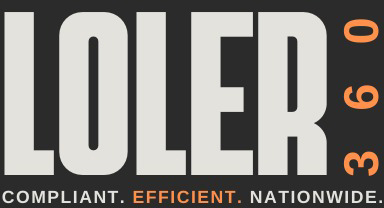If your workplace uses lifting equipment—anything from hoists and cranes to patient lifts and forklift trucks—you’re likely subject to LOLER regulations. But what exactly does LOLER mean, and who needs to pay attention to it?
This guide explains what a LOLER inspection is, why it’s legally required, and how you can stay compliant without the stress.
What Is LOLER?
LOLER stands for the Lifting Operations and Lifting Equipment Regulations 1998. It’s a piece of UK legislation designed to ensure lifting equipment is used safely and is kept in good working condition.
LOLER applies to employers and self-employed people who provide lifting equipment for use at work. It also applies if you control the use of lifting equipment—so even if you don’t own it, you may still be responsible for ensuring it’s safe.
What Counts as Lifting Equipment?
LOLER covers a wide range of lifting gear, including but not limited to:
- Forklifts
- Patient hoists
- Mobile elevating work platforms (MEWPs)
- Gantry cranes and jibs
- Lifting accessories (slings, shackles, chains, etc.)
- Vehicle tail lifts
- Engine hoists
- Goods lifts
In short, if it lifts, lowers, or suspends loads—and is used in a work environment—it likely falls under LOLER.
What Is a LOLER Inspection?
A LOLER inspection (sometimes called a “thorough examination”) is a systematic check of lifting equipment by a competent person. This is not the same as routine maintenance or daily checks—it’s a detailed, documented assessment that ensures the equipment is:
- Structurally sound
- Free from defects or excessive wear
- Safe to use for the intended purpose
- Compliant with the law
The inspection also looks at associated components like safety catches, control systems, and even user manuals and logbooks.
How Often Do LOLER Inspections Need to Be Done?
LOLER inspections must be carried out at regular intervals, usually:
- Every 6 months for lifting accessories or equipment used to lift people (e.g. patient hoists)
- Every 12 months for other general lifting equipment (e.g. forklifts, gantry cranes)
- After installation or major repairs
- After exceptional circumstances such as impact damage or equipment failure
What Happens If You Don’t Comply?
Failure to comply with LOLER can lead to:
- Enforcement action by the HSE (Health and Safety Executive)
- Heavy fines or prosecution
- Voided insurance policies
- Serious workplace accidents or fatalities
Beyond the legal and financial risk, failing to carry out LOLER inspections could mean exposing your staff, service users, or visitors to avoidable danger.
Do You Need a LOLER Inspection?
You do if:
✅ You own or lease lifting equipment for business use
✅ You use lifting accessories (chains, slings, shackles, etc.)
✅ You operate in sectors like care, construction, manufacturing, warehousing, or logistics
✅ You’re responsible for staff who use lifting equipment
Still unsure? At LOLER360, we provide free compliance consultations to help you determine your legal obligations and how to meet them.
Stay Compliant With LOLER360
At LOLER360, we specialise in fast, flexible, and fully certified LOLER inspections across the UK. Whether you operate in a single care home or manage multiple industrial sites, we’ve got you covered—with digital reports, helpful reminders, and a no-fuss service that keeps you legally safe.
Ready to book an inspection or need guidance?
We’ll make compliance one less thing to worry about.




